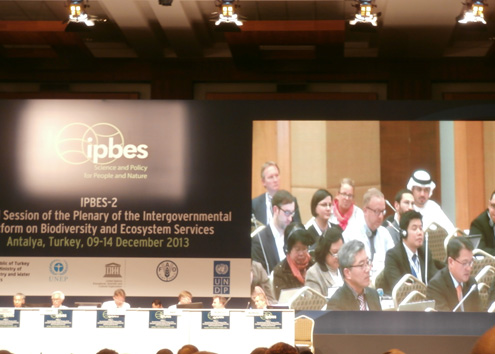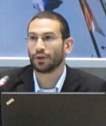Disclaimer: the views expressed hereby represent the personal impressions and opinion of the writer, and do not attempt to represent SCB as a whole.
IPBES continues to grow. There are now 115 members, and more than 100 listed observers. About 30 new observers were admitted today without discussion, and the Plenary moved smoothly into presentations of the Work Programme, the Conceptual Framework, and the Budget.
 Bege Jonsson (center, white coat) speaks at the opening plenary at IPBES-2 on 9 Dec. in Antalya, Turkey Bege Jonsson (center, white coat) speaks at the opening plenary at IPBES-2 on 9 Dec. in Antalya, Turkey |
Now, if you thought that the name IPBES might imply focus on Biodiversity and Ecosystem Services, the Conceptual Framework may surprise you. IPBES starts with talking about “Nature”, “Mother Earth” and “System of Life”. If we (scientists) consider ecosystems as supporting “Quality of Life” or “human well-being”, the Conceptual Framework adds the terms “Living in harmony with nature” and “living in balance with Mother Earth.” Sounds strange? Not if you hear Bolivia’s support of the conceptual framework and its assault on Programme of Work (Hereafter, PoW if you don’t mind).
The point is that being inclusive requires consideration of other schools of thought and other visions of the world. As explained at the plenary, the MEP has made huge efforts to translate western terms into world-encompassing ones, while trying not to lose pragmatism on the way. The outcome is quite impressive, even if thought-provoking.
Notably, however, as the Conceptual Framework was actually developed only after the PoW, which was written only after the Stakeholder Engagement Strategy, the three simply don’t align well with each other. As Bolivia put it: the Assessments are severely plagued with a western, colonialist, capitalistic approach which views the world through money.
True, one has to admit, but the good thing is that this can still be rectified.
Coming to money, though, our SCB delegation maintains some serious concerns. IPBES' suggested budget for 2014-2018 was set at only $39 million USD. For the size of such a platform, this is actually inadequate. The sum is reachable, and Norway alone agreed to offer $8 million to support. But would it be sufficient? SCB and other organizations have identified a major gap, where, even if approved and supported, there is simply not enough budget allocated to supporting the engagement of stakeholders—without which, how exactly can IPBES deliver what it should?
Following short contemplation, we decided SCB should make its own intervention in the opening Plenary. We raised a hand, marked a wish, and were nearly to give up when suddenly the opportunity fell on us due to a minor error: we had been erroneously recognized as Saudi Arabia by the Chair, meaning that we had a priority over eight other interventions… Excited but concrete, Bege Jonsson raised our concerns about the limited funding for stakeholder involvement, the need to make reference to the Aichi targets set by the Convention on Biological Diversity, and the lack of concrete plans on how to secure a bottom up, regionalized structure of IPBES—which SCB can support through its structure.
**Disclaimer: This blog entry reflects a personal account of IPBES from SCB IPBES Delegate Guy Pe'er and does not necessarily reflect the views of SCB
Blog Posts from SCB's IPBES Delegation
SCB IPBES Resources
Author Bio
Guy Pe'er is a board member for SCB Europe and a member of the Society's IPBES delegation.
 Bege Jonsson (center, white coat) speaks at the opening plenary at IPBES-2 on 9 Dec. in Antalya, Turkey
Bege Jonsson (center, white coat) speaks at the opening plenary at IPBES-2 on 9 Dec. in Antalya, Turkey